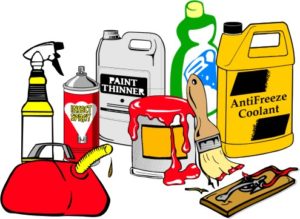WHAT IS HAZARDOUS WASTE?
Household Hazardous Waste is FREE to dispose of by any RCSWD residential permit holders by APPOINTMENT or Walk-in (Tue-Wed-Thu)!
Some materials are free to all, as they are covered by Extended Producer Responsibility (EPR) laws.
There are three options for disposing of hazardous waste produced in-home:

- Drop it off at our Regional Transfer Station HHW Depot on Gleason Road in Rutland. Now open by appointment only. Purchasing a permit is required to dispose of hazardous waste at the Gleason Road Transfer station.
- HHW Depot is open for walk-ins, Tues-Weds-Thurs from 730am-2pm.
- Take it to one of the Rural HHW collection events at your local transfer station throughout the year.
It is recommended that customers make an appointment, especially quantities over 1 square foot of material for the Hazardous Waste Depot, this will expedite your drop off experience.
WHY IS PROPER DISPOSAL NECESSARY?
Keeping hazardous waste out of the landfill, wastewater and surrounding ecosystems is a priority of Solid Waste Management Entities. Chemicals in certain products will cause damage to the organisms that live in the area, which includes humans. Keeping hazardous wastes separated and controlled requires some effort, but is mandatory by law, as well as the right thing to do in consideration of the environment and each other.
Paint, Batteries, Pesticides, Thermostats, and Pharmaceuticals are some common hazardous wastes. See why and where to dispose of them properly.
COMMERCIAL GENERATORS
View the Hazardous Waste disposal prices for businesses.
Hazardous waste produced by commercial entities, such as automobile shops, is often too much for our facilities to handle, and must be permitted through the VT Department of Environmental Conservation. Small businesses that don’t produce much hazardous waste may be Conditionally Exempt Small Quantity Generators (CESQGs), and can dispose of products in the same manner as residents (see above). To find out if your business is exempt from permitting, visit this page: CESQG.
